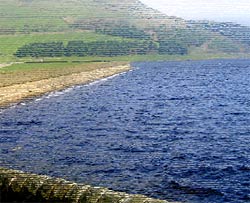 Mesha Maren
Mesha Maren
Eminent Domain
The road dead-ends into a muddy patch of gravel littered with Michelob Light cans and empty bags of Doritos. I stop the car but keep the engine running. Through the scraggly pines the water is moving. As a kid I remember the pines towered heavy over me. The few needles they have left now are covered in what looks like fake snow. Something is killing them. I turn the car off and push my seat back, stretch out my legs. A few raindrops splatter on the windshield. The clouds hang low, pregnant with moisture. I’m surprised I found my way here just by memory.
A visit to the reservoir seemed like a good idea this morning, well maybe less like a good idea and more like my only idea. I called in to work so I could have time to unpack. Everything is still in boxes. All weekend I tried to invent ways to keep the kids out of the house. Mandy and Blake don’t like my new place. They don’t say anything but I can tell. I can’t blame them really. It’s one of those complexes with about fifty shoe box apartments stacked on top of each other. The building hunkers, braces itself.
Mandy and Blake only come for part of the week anyhow. As the lawyer explained it, my “schedule is not conducive to childcare,” meaning I can’t be home to greet them with milk and cookies when they get off the bus. I also can’t afford an “after school caretaker” as Paul can.
All weekend I almost asked the kids if Paul had gone on any dates. But I didn’t. I couldn’t figure out how to form the words. I haven’t been able to bring myself to unpack either. I sit at the Formica kitchen island and stare at the letter from Maddox & Anderson. The sum total of what is left of my marriage fits on a piece of 8 by 14 inch double thick paper. 16 years, 2 kids, 1 Ford Focus, 1 Electrolux bagless vacuum cleaner, 10 silver teaspoons, a Tiffany lamp, a set of stainless steel cookware, a couple of Waterford cut glass vases…
Paul says he is ready for a new stage in his life, ready to be single again. He says he doesn’t think our marriage was going anywhere. “Hey,” he says, “we were just kids when we got married, that was a long time ago…we’ve drifted apart.” I thought drifting apart was something that happened when you were little, you didn’t see your best friend over summer break and you drifted apart, you avoided eye contact on the playground when school started again in September. I thought marriage was a blockade against drifting, like tying your life rafts together.
Paul explains that he is being “more than reasonable.” He’s even let me have things that came from his mother (silver teaspoons, Tiffany lamp) because he distinctly remembers her giving them to me, not us. The us that no longer exists. That thing that was not me or him but the space where we overlapped.
The rain falls harder, hitting the windshield in fat audible drops. I didn’t bring a raincoat. I should get out and go down to the reservoir or just go ahead and leave already. I push the door open with my foot, the wind is stronger than I thought. My hair blows up in my eyes and the wind finds all the gaps in my clothing. The air smells of dark soil and growth. The skinny dirt path is covered in cigarette butts and someone’s forgotten underwear.
The ground at the edge of the tree line sinks down soft and deep under my sneakers as I walk out onto the muddy beach. The wind whips the water into choppy waves. Far up at the end the heavy cement walls of the dam rise thick. Graphite colored clouds rest on the giant fortress. When I was little my great uncle always talked about how before the dam there was a valley. They filled it with water. Before the water the valley was full of family farms. Big families on little tobacco farms. When the government decided to build the hydro dam they took all the land. One old woman refused to leave. She stood on her porch with a shotgun and wouldn’t let them come near. My uncle said she stayed there when they filled the valley. As a child her watery image kept me close to shore.
I can feel my lips chapping from the wind. There is nothing here, a few pieces of trash tumble-weeding about, a red canoe. If I go back to the car I’ll eventually have to go back to the apartment so I kick at the plastic canoe. It seems sturdy enough, no holes.
Water soaks through my left shoe as I push it into the water. It’s heavier and bulkier than I thought it would be. I climb in clumsy and wet my leg nearly to the knee. The cold reaches up, wraps its fingers around me. From out in the water I can see the whole shoreline, an abandoned Igloo cooler, a fish with its eye pecked out, discarded condoms. I don’t know what I expected it to look like, but not like this.
Paul and I came here once when we first dated. I worked as a secretary at the real estate office his dad owned. On our fifth date, after two bottles of Vintage Chardonnay, Paul announced that he wanted me to take him to my favorite place. I laughed and blushed and told him that my couch and my bed were my favorite places. He insisted that there was some place that I loved that would tell him something about me, help him to know me better. The only place I could think of that I’d ever gotten very excited about was the reservoir. We drove and got lost and drove again. When we got there the moon reflected in the water. It must have been warm outside because we took off our clothes and waded in. In the dark we couldn’t see the broken glass and rusted fish hooks.
When he proposed to me a few months later all I could do was laugh. It seemed so unbelievable I laughed until I spewed a fountain of bubbly wine out my left nostril. I don’t know which shocked me more, the moment he asked me to marry him or the moment sixteen years later when he told me he wanted a divorce. I felt so desperately ready to shed my single-woman-status that to me Paul barely existed. I only saw the outline of him, a man with an engagement ring. Like the guy, whose name I don’t remember with whom I finally rid myself of my virginity, embarrassingly late, after years of fabricated sex stories.
The boat is rocking or I am shaking. The wind pushed the boat away from the shoreline more quickly than I anticipated. I didn’t really think about the lack of paddles. The shore is not far away. I could swim. The rain let up but I am shivering so much I can’t sit still. My damp shirt sticks to my lower spine. I reach into the water, paddle my hand uselessly. The longer I keep my hand in the water the warmer it feels. The water changes colors, reflecting gray sky and brown trees. My fingers look softer, smoother under there. There is so much water under me, a valley full. The inky dark is only the surface, deeper it is mermaid green, deeper I can see her house, shingle roof, white walls, long porch, the pig pen out back and the little tin-roofed chicken house. Through the window I see the kitchen table, apple peels and flour on the cutting board. It isn’t a whole lot, a small farm, tobacco is the only thing that pays, but it’s everything I know. It’s everything I have. The rest of the world out there is nothing I want to know about. I don’t care to adapt. I stand strong, feet planted on my front porch as the white plume of water thunders down into the valley.
© Mesha Maren 2010
This story may not be archived, reproduced or distributed further without the author's express permission. Please see our conditions of use.
The Barcelona Review is a registered non-profit organization
 Mesha Maren’s fiction has appeared in Babel Fruit Journal, Ascent Aspirations Magazine, Headwaters Journal and Up the Prose Journal. She was a two time finalist in the Press 53 Open Awards and a finalist in the Flat Iron Writers Contest. She lives in Asheville, North Carolina.
Mesha Maren’s fiction has appeared in Babel Fruit Journal, Ascent Aspirations Magazine, Headwaters Journal and Up the Prose Journal. She was a two time finalist in the Press 53 Open Awards and a finalist in the Flat Iron Writers Contest. She lives in Asheville, North Carolina.
Contact the author